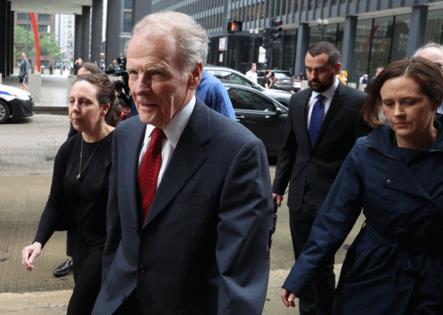Ex-House Speaker Michael Madigan reports to federal prison in West Virginia
Published in News & Features
CHICAGO — Former Illinois House Speaker Michael Madigan reported to a low-security federal prison camp in West Virginia on Monday to begin serving his 7 1/2-year sentence on corruption charges, an ignominious end for a man who for decades was considered the most powerful politician in the state.
Madigan, 83, arrived Monday morning at the facility in Morgantown, which has an all-male population of about 180 inmates, according to an intake official at the prison.
At Madigan’s sentencing in June, his lawyers asked that he serve his time at the medium-security facility in Terre Haute, Indiana, which is only about 180 miles south of Chicago. The Morgantown facility, meanwhile, is about an eight-hour drive.
It was unclear if that request had changed or if the U.S. Bureau of Prisons made the decision.
Madigan’s attorneys were not immediately available for comment.
Under federal rules, Madigan must serve 85% of his sentence, which would work out to just over six years. But under the First Step Act, which allows elderly inmates to request placement in home confinement, Madigan could actually be released much sooner.
Madigan’s former Democratic colleague, ex-Chicago Ald. Edward Burke, who was convicted in 2023 in a separate corruption case, served only about nine months of his two-year prison term behind bars before being released on home confinement in July.
Burke, 81, will remain on home confinement until Jan. 6, when his one-year term of supervised release is set to begin.
Known as “The Velvet Hammer” for his firm but quiet leadership style, Madigan, who had a record run as speaker and served for years as the leader of the state Democratic Party, was convicted by a jury Feb. 12 on bribery, conspiracy and other corruption charges. The jury found him guilty on 10 of 23 counts, including a multipronged scheme to accept and solicit payments from Commonwealth Edison to Madigan associates for do-nothing subcontracts.
Madigan also was convicted on six out of seven counts — including wire fraud and Travel Act violations — regarding a plan to get then-Chicago Ald. Daniel Solis, who testified at length in the trial, appointed to a state board.
The jury acquitted Madigan of several other schemes alleged in the indictment and deadlocked on other counts, including the overarching racketeering charge.
The same jury deadlocked on all counts involving his co-defendant, longtime confidant Michael McClain, and prosecutors later opted not to retry McClain and dropped the charges. McClain was convicted, however, in the parallel “ComEd Four” bribery case for much of the same conduct and has been sentenced to two years behind bars.
Also convicted in the ComEd Four case was John Hooker, a former top ComEd internal lobbyist who was sentenced to a year and a half behind bars. Hooker is set to report to prison Tuesday. Another defendant, former City Club of Chicago leader Jay Doherty, is currently in prison in Terre Haute, Indiana.
The fourth defendant from that case, former ComEd CEO Anne Pramaggiore, is due to report to prison Dec. 1, though both she and McClain are asking to remain on bond pending appeal.
U.S. District Judge John Robert Blakey sentenced Madigan in June to 7 1/2 years in prison, saying Madigan’s crimes represented “abuse of power at the highest level” and were aggravated by the fact that Madigan had every advantage in life, including a privileged education and thriving law practice.
The judge also found that Madigan lied repeatedly and willfully when testifying in his own defense during the trial. Blakey called it “a nauseating display of perjury and evasion” that was “hard to watch.”
After his sentencing, Madigan asked Blakey to remain free on bond pending his appeal, which is still being litigated before the 7th Circuit U.S. Court of Appeals.
Blakey denied the motion, saying his evidentiary rulings and jury instructions were legally sound, and that Madigan’s attorneys had failed to reach the “nearly insurmountable” legal hurdles required to win an appeal bond.
Madigan’s attorneys later asked the 7th Circuit for an appeal bond, arguing he should remain free for a number of reasons, including that he’s not a flight risk and that there are complex legal issues that, if resolved in his favor, will require a new trial. That motion was denied last week in a one-page order.
Meanwhile, Madigan’s opening appellate brief is not due until Nov. 3, and the court will likely not hold oral arguments on the case until sometime in early 2026.
_____
©2025 Chicago Tribune. Visit chicagotribune.com. Distributed by Tribune Content Agency, LLC.







Comments